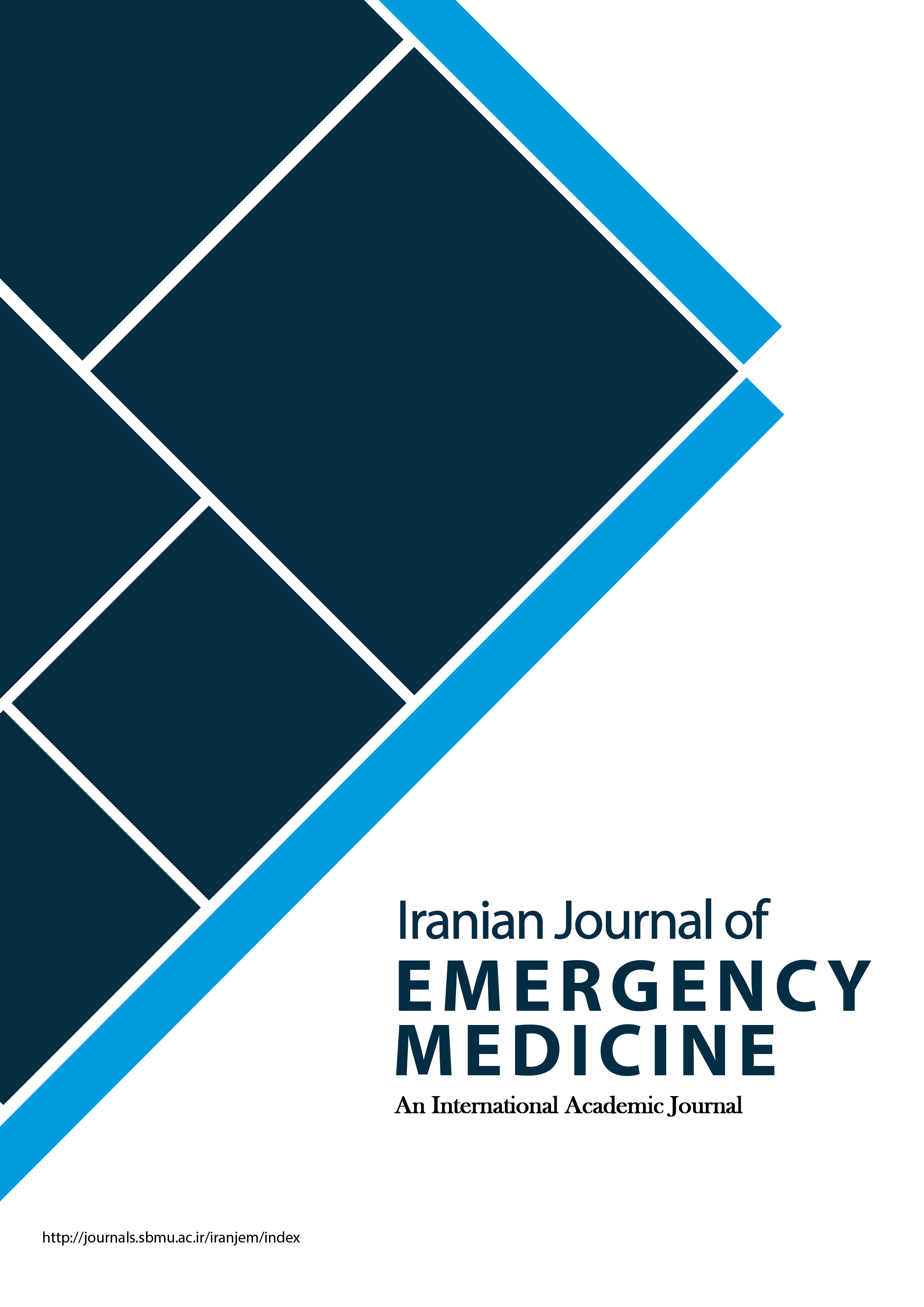Knowledge of Emergency Medical Service Staff on Crisis Management
Iranian Journal of Emergency Medicine,
Vol. 5 No. 1 (2018),
8 February 2018
,
Page e3
https://doi.org/10.22037/ijem.v2i1.17470
Abstract
Introduction: Since emergency medical service (EMS) staff members are the first providers of health care at times of crisis, this study was done with the aim of determining the knowledge of EMS staff on crisis management and its related factors in all emergency bases located throughout Chaharmahal and Bakhtiari province, Iran. Methods: This study was done as a descriptive cross-sectional one. Sampling was done via convenience sampling. The tool used for data gathering was a questionnaire prepared by a researcher that included questions regarding demographic characteristics and knowledge of EMS staff on crisis management, which evaluated their knowledge in 4 categories of educational, management related, professional, and safety related. 4 questions were asked in each category that assessed the knowledge of EMS staff on Likert scale using 5 choices of none, low, moderate, high, and very high. Validity of the questionnaire was evaluated using the content validity method and its reliability was calculated to be 88% via Cronbach’s alpha. To analyze the data, SPSS 13 software and descriptive statistics methods were applied. Results:Data analysis showed that 100% of the participants in this study were male and their mean age was 27.52 ± 6.47 years. Knowledge of the EMS staff on crisis management was very high in 2.2 % of the participants; high in 10.2%; moderate in 48.4%; and low in 39.2%. In evaluation of statistical correlations it was determined that educational level, attending crisis maneuvers, and crisis committee membership directly correlated with knowledge of the participants on crisis management (p < 0.05). Conclusion: The results of the present study indicate the relatively low knowledge of EMS staff members on crisis management and its related factors, which points out the need for education and holding maneuvers to improve their knowledge in order to be prepared for facing crises.- مدیریت مراقبت از بیمار؛ مدیریت منابع انسانی، بهداشت و درمان؛ دانش نگرش و مهارت بهداشت؛ پرسنل پیش بیمارستانی
How to Cite
References
Ghahri M. Risk management in accidents. Proceedings of Safety and Prevention of accidents. 2004:153-5.
Tramontin M, Peters JJ. Disaster Mental Health Services: A Primer for Practitioners (Series in Psychological Stress) Myers, D. & Wee, DF (2004). New York: Routledge. Hardcover: 312 pages; ISBN 1583910638. List Price: $59.95. Taylor & Francis; 2008.
Ghanefar S, Tabar A. Iran’s strategy on natural disaster risk management. Geotechnical Engineering For Disaster Mitigation And Rehabilitation: (With CD-ROM): World Scientific; 2005. p. 539-42.
Yarmohammadian MH, Fooladvand M, Haghshenas A, Atighechian G, Alavi A. Crisis management competencies and their relation to self-efficiency of managers in the organizations related to disasters. International Journal of Health System and Disaster Management. 2013;1(2):64.
Jahanbakhsh M, Tavakoli N, Hadadpour A. Designing disaster victim's medicl record; a step toward crisis management. Health information management. 2011;7(4):400-9.
Tzeng H-M, Yin C-Y. Crisis management systems: staff nurses demand more support from their supervisors. Applied nursing research. 2008;21(3):131-8.
Malekshahi F, Mardani M. Abilities and limitations of crisis management in Shohadaye Ashayer and Social Security hospitals of Khorramabad in 1385. Journal of Critical care nursing. 2009;1(1):29-34.
Daneshmandi M, Amiri H, Vahedi M, Farshi M, Saghafi A, Zigheymat F. Assessing the level of preparedness for confronting
crisis such as flood, earthquake, fire and storm in some selected hospitals of Iran. Military Medicine Journal. 2010;12(3):167-71.
Nasiri-Pour A, Raeissi P, Mahbobi M. Border hospital readiness in handling border related crisis in Kermanshah Province, Iran, 2007. Journal of Health Administration. 2007;10(28):41-8.
Aldridge J. Hospital Security: the past, the present, and the future. SecurityInfoWatch com. 2005.
Mastaneh Z, Mouseli L. Capabilities and limitations of crisis management in the teaching hospitals of Hormozgan University of Medical Sciences, 2010. Scientific Research and Essays. 2013;8(26):1196-202.
Daneshmandi M, Amiri H, Vahedi M, Farshi M. Assessing level of Preparedness for disaster in hospitals of a selected medical sciences university-1388. Journal Mil Med. 2010;12(3):167-71.
Hajavi A, Shojaei Baghini M, Haghani H, Azizi A. Crisis Management in Medical Records Department in Kerman and Borujerd Teaching Hospitals 2006 (Providing Model). Journal of Health Administration. 2009;12(35):9-16.
Reddy MC, Paul SA, Abraham J, McNeese M, DeFlitch C, Yen J. Challenges to effective crisis management: using information and communication technologies to coordinate emergency medical services and emergency department teams. International journal of medical informatics. 2009;78(4):259-69.
Ojaghi S, Nourizad S, Mahboobi M, Khazaei M, Najafi G. Disaster crisis handling preparedness level of hospitals in Kermanshah. Journal of Kermanshah University of Medical Sciences (J Kermanshah Univ Med Sci). 2009;13(3).
- Abstract Viewed: 994 times
- PDF (فارسی) Downloaded: 705 times
- HTML (فارسی) Downloaded: 105 times



